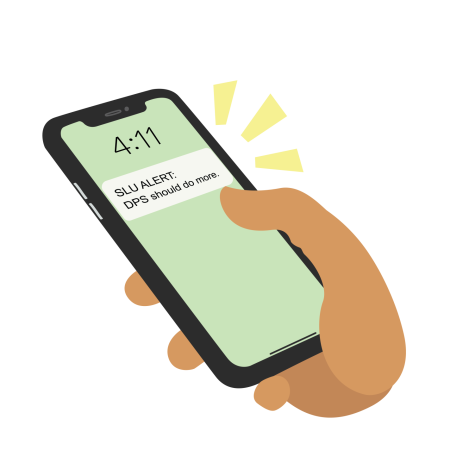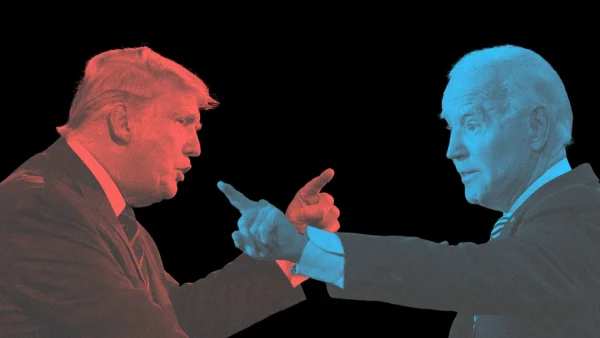Is SLU Really Doing its Best by Students
SLU Alerts Aren’t Cutting It

When talking about safety on university campuses, one of the first things that comes to mind is the blue light system. Every campus tour guide I see walking around has mentioned how you can use the blue light phone when in danger and the Department of Public Safety will come to you. But who would wait for DPS to come before calling 911?
Students across the nation are put in danger so frequently it no longer fazes anyone. According to a study of various safety measures, St. Louis City was rated the least safe out of 182 cities in America reaffirming the idea that students at SLU need to be extra prepared. People regularly walk around with tasers, pepper spray and sometimes even knives without knowing how to use them. Recently, I overheard a group of freshmen mention that they had to leave their friend’s room because they accidentally set off their pepper spray. The SLU DPS website should offer tips and demonstrations on how to safely and appropriately use these tools.
Like other students, I signed up for SLU Alerts when I first committed. The system is responsible for sending students safety updates on dangerous situations that need to be avoided. Regularly, students are notified of attempted robberies, thefts and other dangerous situations.
At approximately 1:30 am on Wednesday, Aug. 31, I was awoken by screaming coming from outside my window. I opened my blinds and saw five DPS officers surrounding a man in handcuffs who was lying face down in the grass. The man was screaming to let him go and that they were hurting him. I shut my blinds quickly and gathered myself for a moment before reopening them and watching the officers carry the man away. I waited for what I expected to become another SLU alert. I waited an hour. I waited a day. And still, weeks later nothing was said about it. It had been so long I was starting to convince myself I imagined it all.
Last year, I lived in Griesedieck Hall and we had an incident in which an individual from outside the SLU community was walking into people’s rooms and watching them sleep. As residents, we were only alerted by other students through word of mouth. Not by our RAs. Not by DPS. The residents on my floor were scared to go anywhere alone, or even shower without someone standing guard, for over a week before SLU finally sent out an email.
While I am not saying students should be told everything right away because it would cause mass panic, completely ignoring these events is not the way to go about it either. In October 2021, SLU DPS faced an external review from The Riseling Group, a consulting firm that provides management services to the law enforcements of universities and businesses. While the review discussed everything from the salary of DPS officers to their training, the key points were the lack of staffing and the lack of connection officers had with the students they are meant to protect. According to this report, SLU DPS was severely understaffed and needed twice as many field officers along with additional administrators and dispatch officers. This poses a threat to students because at times during eight hour shifts as few as five officers were patrolling North campus by foot with only two additional officers in vehicles. If a student was in danger, it would take far longer than it should for an officer to reach them.
The review states the officers’ view of their positions, “They made it clear that they planned to leave to join a ‘real’ police department. There are other officers who have retired from other police departments, including the St. Louis Metropolitan Police Department, and view SLU DPS as a good retirement position.” How are we supposed to feel safe when DPS officers do not seem to take their job seriously? It is the responsibility of SLU to do everything they can to protect us while on campus and it starts with the people they choose to hire and the funding DPS receives. With additional funding DPS officers would be able to build better rapport with students, so that students feel like they can trust DPS.
In part, some safety concerns are common sense like not walking alone at night or being aware of your surroundings. However, entering a new environment is challenging and it is the responsibility of the school to teach students how to be safe in unknown situations. With more funding to DPS, officers could educate students on how to be safe while also building strong community relationships.
SLU should not be hiding on-campus incidents nor should they allow students to be unaware of the appropriate safety measures. When it comes down to it, SLU should incorporate more safety tips and lessons on their website and into SLU 101. Compared to other safety departments, such as Washington University in St. Louis, the SLU website isn’t as accessible and does not offer advice to students who want to learn more about how to stay safe. Additionally, SLU 101 is meant to teach students about campus life which includes safety. With more funding, DPS could partner with SLU 101 in providing basic safety tips to students during orientation.
Your donation will support the student journalists of Saint Louis University. Your contribution will help us cover our annual website hosting costs.










